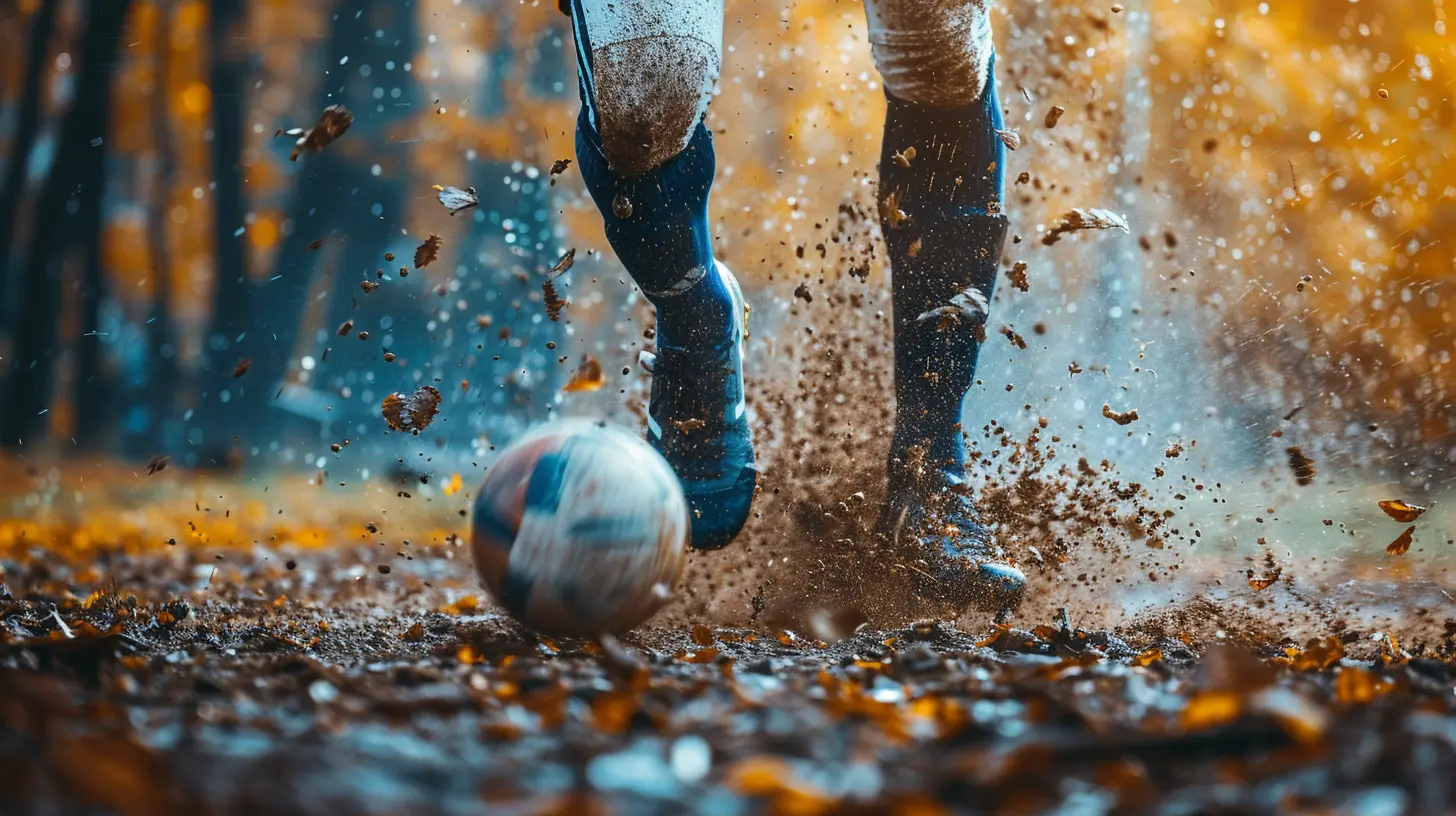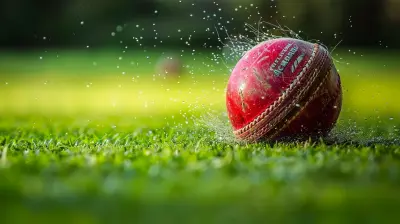Developing Grit in Sports: How to Stay Motivated Through Adversity
7 September 2025
Success in sports isn't just about talent, speed, or strength. Sure, those things matter, but there's something else, something less tangible that often makes the difference between a good athlete and a great one. It's grit. Grit is what keeps athletes pushing forward, even when the going gets tough, when they're tired, sore, or doubting themselves. It's the inner strength that keeps them motivated through adversity, and it’s something anyone can develop.
In this article, we’ll dive into what grit is, why it’s essential in sports, and how you can cultivate it to stay motivated no matter what challenges you face.

What is Grit?
Grit isn't just about working hard. It’s a combination of perseverance and passion. It’s that stubborn refusal to give up, even when the odds are stacked against you. Psychologist Angela Duckworth, who popularized the concept of grit, defines it as the relentless commitment to long-term goals despite setbacks or failures.In sports, grit is the capacity to keep training, keep practicing, and keep competing, no matter how many times you lose or fall short. It’s the ability to get back up when you’ve been knocked down, to lace up your boots or sneakers, and to keep going when every fiber of your being is telling you to quit.
Why Grit Matters in Sports
You’ve probably heard stories of athletes who started from nothing and rose to the top through sheer determination. Think about Michael Jordan, who was cut from his high school basketball team, or Serena Williams, who faced countless challenges on her road to becoming a tennis legend. What sets these athletes apart isn't just their skill—it’s their grit.Grit matters in sports because talent alone isn’t enough. You could be the fastest runner or the strongest lifter, but if you lack the persistence to train consistently or the mental toughness to push through adversity, that talent won’t take you far. Sports are full of highs and lows, and grit is what helps athletes navigate those emotional rollercoasters.

The Connection Between Grit and Motivation
We all know how easy it is to feel motivated after a win or a personal best. But what about when you’re stuck in a slump, when the losses pile up, or when you’re sidelined by injury? That’s when grit comes into play.Short-Term Motivation vs. Long-Term Grit
Motivation is often fleeting. You might feel pumped after watching a motivational video, reading an inspirational quote, or listening to your favorite pump-up song. But that motivation tends to fade after a while. Grit, on the other hand, is long-lasting. It’s the force that keeps you going even when motivation dips.Think of motivation as a spark and grit as a slow-burning fire. The spark gets you excited, but it’s the fire that keeps you warm for the long haul. Athletes with grit don’t rely solely on bursts of motivation to keep them going. They have this deep, internal drive that pushes them to continue, even when the excitement wears off.
How Grit Helps You Stay Motivated Through Adversity
Life as an athlete isn't always smooth. Injuries, fatigue, mental blocks, and even personal struggles can throw you off course. But athletes with grit have a mindset that helps them keep pushing forward. They accept that failure and setbacks are part of the process. Instead of seeing adversity as a reason to give up, they view it as a challenge to overcome.When you have grit, you're less likely to be discouraged by a bad game or a missed shot. You recognize that one failure doesn’t define your entire journey. Every loss is an opportunity to learn, grow, and come back stronger.

How to Develop Grit in Sports
Now that we’ve established why grit is crucial, the next question is: How can you develop it? The good news is that grit isn’t something you’re born with. It’s a quality you can cultivate with intentional effort over time. Here are some key strategies to help you build grit and stay motivated through adversity.1. Set Long-Term Goals
One of the defining characteristics of gritty athletes is their focus on long-term goals. Instead of only aiming for short-term achievements, they have a clear vision of where they want to be in the future. This long-term perspective helps them stay motivated, even when the immediate results aren’t what they expected.Ask yourself: What’s your big goal? Do you want to make it to the Olympics, win a championship, or break a personal record? Keep that goal in mind and remind yourself of it every time you face a challenge.
But don't stop there. Break that long-term goal into smaller, manageable steps. Each training session, each practice, and each game is a small piece of the bigger puzzle. Keeping your eyes on the prize will make it easier to push through the tough times.
2. Embrace Failure as a Learning Opportunity
In sports, failure is inevitable. You’re going to lose games, miss shots, and make mistakes. It’s all part of the process. The key is to reframe how you think about failure. Instead of seeing it as a reflection of your abilities, view it as a learning opportunity.Athletes with grit don’t dwell on their mistakes. They analyze what went wrong, learn from it, and then move on. This ability to bounce back from failure is crucial for staying motivated. Every failure is a stepping stone to success if you use it as a chance to improve.
3. Build Mental Toughness
Mental toughness is closely tied to grit. It’s the ability to stay focused, composed, and determined, even in the face of adversity. Mental toughness doesn’t mean ignoring your emotions or pretending everything is fine when it’s not. Instead, it’s about controlling your response to stress and pressure.One way to build mental toughness is through visualization. Elite athletes often use visualization techniques to mentally rehearse their performance before a game or competition. By visualizing themselves succeeding, they build confidence and reduce anxiety. Try incorporating visualization into your pre-game routine to help you stay focused and calm under pressure.
4. Cultivate a Growth Mindset
Psychologist Carol Dweck coined the term “growth mindset” to describe the belief that abilities and intelligence can be developed through hard work and effort. Athletes with a growth mindset see challenges as opportunities to grow, rather than threats to their self-worth.When you have a growth mindset, you’re more likely to embrace challenges, persist through difficulties, and learn from your mistakes. This mindset is essential for developing grit because it helps you stay motivated during tough times. To cultivate a growth mindset, focus on your effort rather than the outcome. Instead of thinking, “I’m just not good at this,” shift your thinking to, “I’m not good at this yet, but I can improve.”
5. Surround Yourself with Support
While grit is often seen as a personal quality, it doesn’t mean you have to go it alone. Surround yourself with a strong support network—coaches, teammates, friends, and family—who can encourage you when times get tough. Everyone needs a little boost now and then, and having people in your corner can make all the difference when you're feeling discouraged.One of the best ways to stay motivated through adversity is to lean on others for support. A coach can offer guidance, a teammate can offer empathy, and friends or family can remind you of why you started in the first place. Grit doesn’t mean doing everything on your own; it means persevering despite challenges, and sometimes that perseverance requires asking for help.
6. Practice Patience
Developing grit takes time. You’re not going to become mentally tough or resilient overnight. Just like building physical strength, building grit requires consistent effort over time. Be patient with yourself and recognize that setbacks are part of the process.It’s easy to get frustrated when you’re not seeing immediate results, but remember: progress is often slow and steady. Every time you push through a difficult practice or get up after a loss, you’re strengthening your grit muscle. Celebrate those small victories along the way, and trust that the work you’re putting in will pay off in the long run.

Conclusion: Keep Moving Forward
Grit is one of the most valuable qualities an athlete can possess. It’s what separates those who succeed from those who quit when the going gets tough. By setting long-term goals, embracing failure, building mental toughness, cultivating a growth mindset, surrounding yourself with support, and practicing patience, you can develop the grit you need to stay motivated through adversity.Remember, grit is like a muscle—it grows stronger the more you use it. So, the next time you face a challenge in your sport, remind yourself that adversity is part of the journey. Keep moving forward, and you’ll come out stronger on the other side.
all images in this post were generated using AI tools
Category:
Sports PsychologyAuthor:

Ruben McCloud
Discussion
rate this article
1 comments
Molly Monroe
Developing grit? More like unleashing your inner badass. If you can’t handle the heat, don’t lace up your sneakers. Embrace the struggle, rise like a phoenix, and remember: champions are just those who refuse to quit. Period.
September 26, 2025 at 10:59 AM

Ruben McCloud
Absolutely! Embracing challenges fuels our resilience and transforms adversity into strength. Keep pushing forward! 🏆🔥


